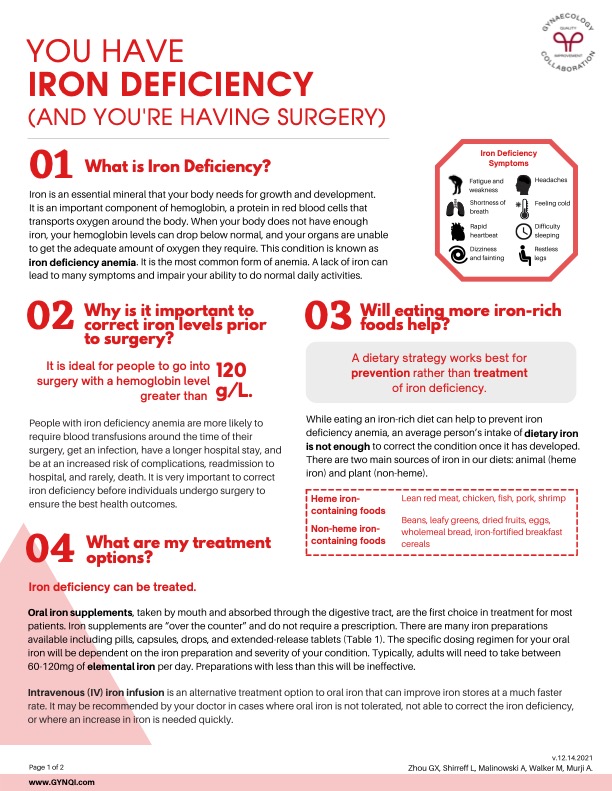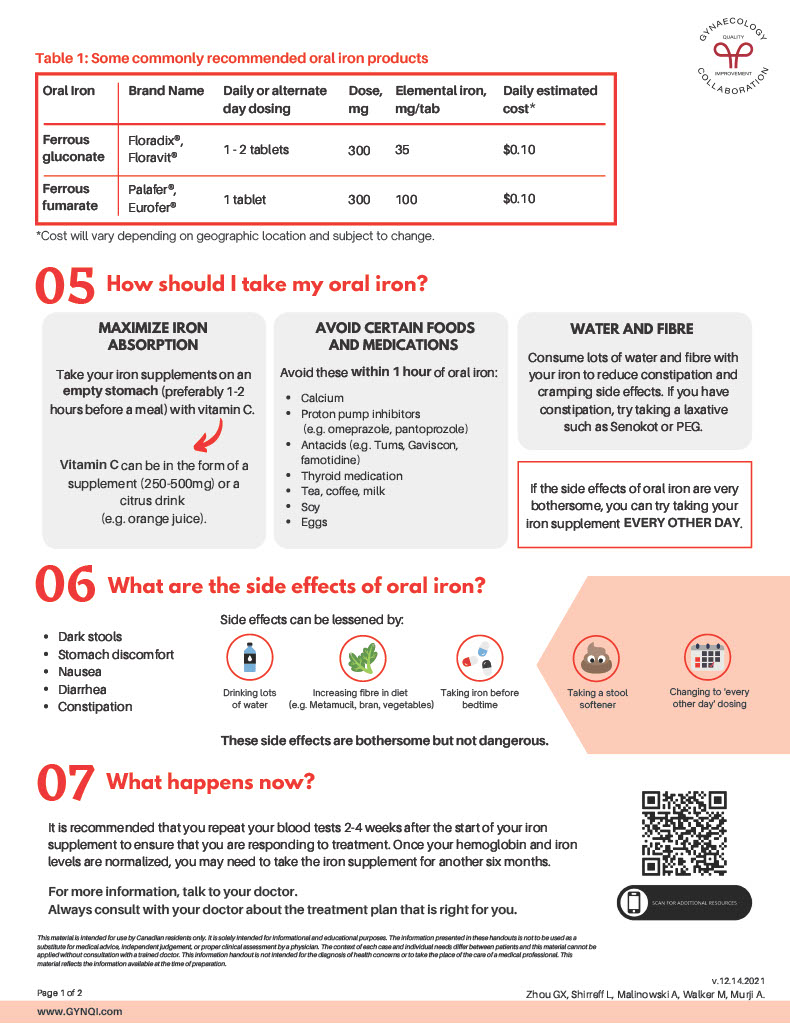

Table of Contents
- Summary
- What is Iron Deficiency?
- Symptoms of Iron Deficiency
- Why is it Important to Correct Iron Levels Before Surgery?
- What Are My Treatment Options?
- Oral Iron Supplements
- Intravenous (IV) Iron Infusion
- How Should I Take My Oral Iron
- Maximize Iron Absorption
- Avoid Certain Foods and Medications
- Water and Fibre
- Will Eating More Iron-Rich Foods Help?
- What Are the Side Effects of Oral Iron?
- What Happens Now?
- Fully Equip Yourself Before Your Surgery
Summary:
- Iron deficiency occurs when your body is lacking in iron, which affects the production of hemoglobin, a protein that carries oxygen in your blood.
- Symptoms of iron deficiency include fatigue, weakness, dizziness, and shortness of breath, which can impact daily activities.
- Correcting iron deficiency before surgery is crucial to reduce risks like infection, complications, and the need for blood transfusions.
- Treatment options include oral iron supplements or intravenous (IV) iron infusions, both aimed at restoring iron levels and improving overall health.
Facing surgery with an iron deficiency diagnosis can feel daunting, but understanding the condition and how it affects your health is a vital first step. Iron plays a crucial role in your body by helping transport oxygen through your blood, ensuring your organs function properly. When your iron levels are too low, it can lead to symptoms like fatigue, weakness, and even complications during surgery. By learning about iron deficiency and following the right treatment plan, you can better prepare your body for your upcoming surgery and improve your chances of a smooth recovery.
What is Iron Deficiency?
You’ve been diagnosed with iron deficiency, and with surgery coming up, it’s important to understand how this impacts your health.
Iron is a vital mineral that helps your body grow and function. It is an important component of hemoglobin, a protein in red blood cells that transports oxygen around the body. When iron levels are too low, your hemoglobin drops, and your organs are unable to get the adequate amount of oxygen they need. This condition is known as iron deficiency anemia and is the most common form of anemia. A lack of iron can lead to many symptoms and impair your ability to do normal daily activities.
Symptoms of Iron Deficiency
Recognizing the symptoms of iron deficiency is key to addressing it early and maintaining your overall health. Symptoms can include:
- Fatigue and weakness
- Shortness of breath
- Rapid heartbeat
- Dizziness and fainting
- Headaches
- Feeling cold
- Difficulty sleeping
- Restless legs
Why is it Important to Correct Iron Levels Before Surgery?
Correcting iron deficiency before surgery is crucial to ensure the best possible health outcomes.
People with iron deficiency anemia are more likely to:
- Require blood transfusions around the time of their surgery
- Get an infection
- Have a longer hospital stay
- Be at an increased risk of complications
- Be readmitted to hospital
- Be at an increased risk of mortality
It is ideal for people to go into surgery with a hemoglobin level greater than 120 g/L.
What Are My Treatment Options?
The good news is iron deficiency can be treated. Treatment options include:
- Oral iron supplements
- Intravenous (IV) iron infusion
Oral Iron Supplements
Taken by mouth and absorbed through the digestive tract, oral iron supplements are the first choice in treatment for most patients. This form of iron supplement is “over the counter” and doesn’t require a prescription.
There are many iron preparations available including:
- Pills
- Capsules
- Drops
- Extended-release tablets
The specific dosing regimen for your oral iron will be dependent on the iron preparation and severity of your condition. Typically, adults will need to take between 60-120mg of elemental iron per day–preparations with less than this will be ineffective.
Intravenous (IV) Iron Infusion
An alternative treatment option to oral iron, IV iron infusion can improve iron stores at a much faster rate. It may be recommended by your doctor in cases where oral iron is not tolerated, not able to correct the iron deficiency, or where an increase in iron is needed quickly.
How Should I Take My Oral Iron?
To get the most benefit from your iron supplements, it’s important to follow the recommended guidelines for how and when to take them.
Maximize Iron Absorption
Take your iron supplements on an empty stomach, preferably one to two hours before a meal, with vitamin C. Vitamin C can be in the form of a supplement (250-500mg) or a citrus drink such as orange juice.
Avoid Certain Foods and Medications
Avoid these within one hour of taking your oral iron supplement:
- Calcium
- Proton pump inhibitors (e.g. omeprazole, pantoprozole)
- Antacids (e.g. Tums, Gaviscon, famotidine)
- Thyroid medication
- Tea, coffee, and milk
- Soy
- Eggs
Water and Fibre
Be sure to consume lots of water and fibre with your iron to reduce constipation and cramping side effects. If you have constipation, try taking a laxative such as Senokot or PEG.
Will Eating More Iron-Rich Foods Help?
A diet rich in iron is more effective for preventing iron deficiency than treating it. Once iron deficiency anemia develops, dietary iron alone usually isn’t enough to correct it.
Our diets provide two main types of iron: heme iron from animal sources and non-heme iron from plant sources.
Heme iron-containing foods: lean red meat, chicken, fish, pork, and shrimp.
Non-heme iron-containing foods: beans, leafy greens, dried fruits, eggs, wholemeal bread, and iron-fortified breakfast cereals.
What Are the Side Effects of Oral Iron?
The common side effects of oral iron can be bothersome, but they are not dangerous. The side effects of taking oral iron supplements can include:
- Dark stools
- Stomach discomfort
- Nausea
- Diarrhea
- Constipation
The symptoms caused by the side effects can be lessened by drinking lots of water, taking a stool softener, increasing the amount of fibre in your diet (e.g. Metamucil, bran, vegetables), and taking your supplement before bedtime.
If the side effects of oral iron are very bothersome, you can try taking your iron supplement every other day.
What Happens Now?
It is recommended that you repeat your blood tests 2-4 weeks after the start of your iron supplement to ensure that you are responding to treatment. Once your hemoglobin and iron levels are normalized, you may need to take the iron supplement for another six months.
Fully Equip Yourself Before Your Surgery
Addressing iron deficiency before surgery is essential for a smoother recovery and better health outcomes. By following your prescribed treatment plan, including taking oral or IV iron, and maintaining a balanced iron-rich diet, you can ensure your body is prepared for your procedure. Monitoring your progress with follow-up blood tests will help ensure your iron levels remain stable, promoting overall well-being and reducing the risk of complications.



